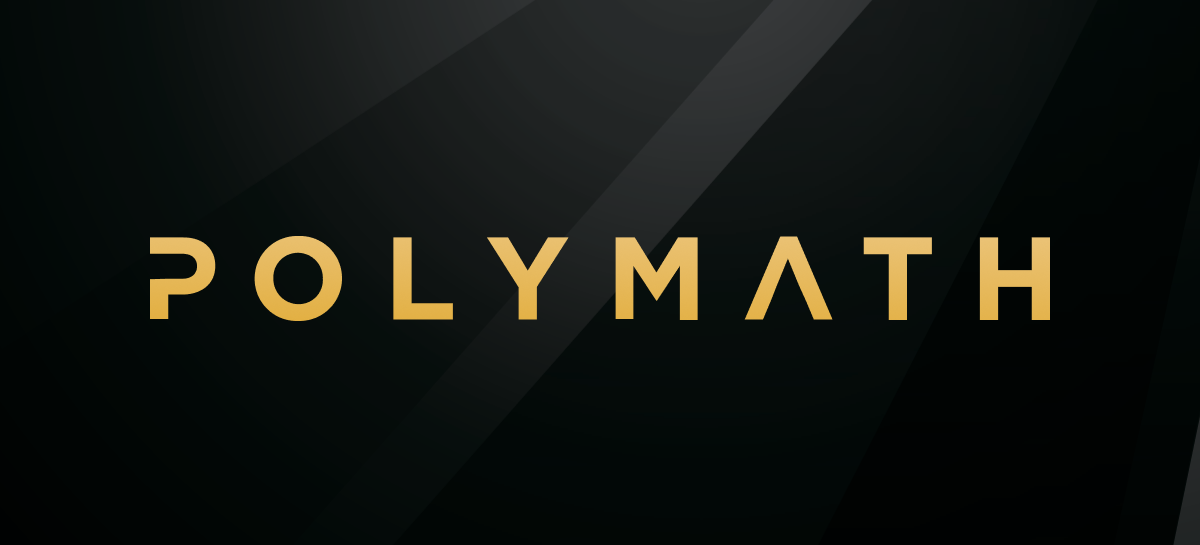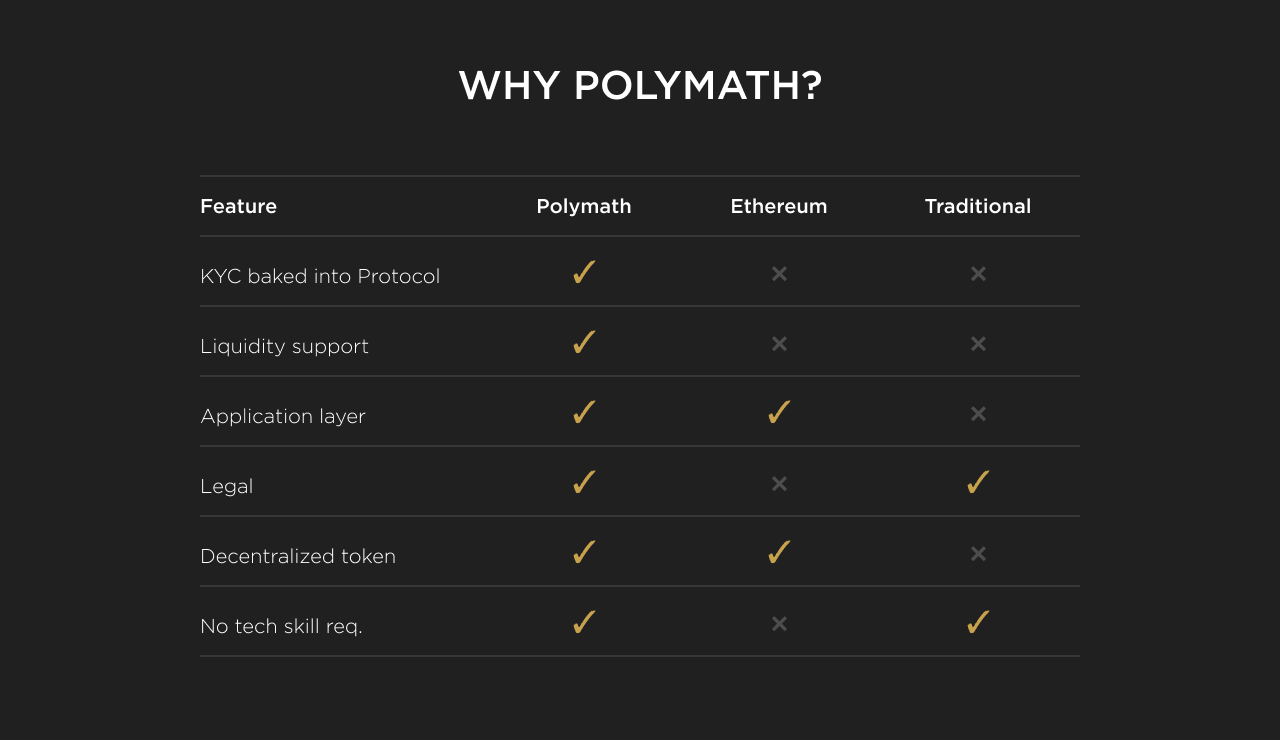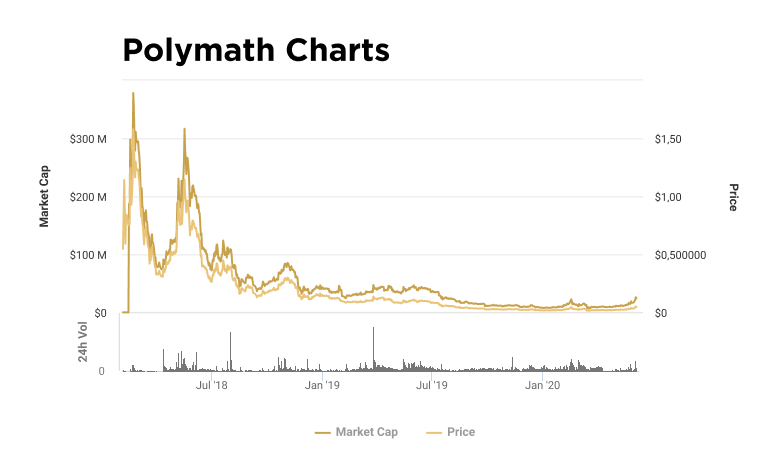
ICO of the project - 09.2017
Standard of the token – ERC1400
Listing - https://coinmarketcap.com/currencies/polymath-network/markets/
Market capitalization - $8 326 796 USD
Total emission – 1 000 000 000 POLY
In circulation - 489 275 816 POLY
Coinmarketcap rating - № 296
Minimal price of the token over the time - $0,015906 USD
Maximal price of the token over the time - $1,66 USD
Website of the project - https://polymath.network/
Blog - https://blog.polymath.network/
Twitter - https://twitter.com/polymathnetwork
Facebook - https://www.facebook.com/polymathnetwork
Telegram - https://t.me/polymathnetwork
Youtube - https://www.youtube.com/c/polymathnetwork
Review of the POLY cryptocurrency
Polymath Network (Polymath) project is one of the “revolutionary” blockchain projects. The key idea thereof is to “digitalize” or “tokenize” the largest financial market – market of securities. We should admit, that the idea is rather bold and ambitious, therefore it should be observed closer.
So, Polymath is a blockchain platform, developed for effective adaptation of classic securities and assets with grandiose technological blockchain solutions. The project has chosen development and implementation of a decentralized platform as its main goal. The platform unites the opportunity of ICO organization and regulation of multibillion securities market, that could be based on blockchain technologies, with emphasize on collaboration with legal acts, contributing to/ensuring the process of transferring securities to the digital blockchain field.
At that, the project’s developers are quite objectively explaining the viability and relevance of transfer of such assets into the blockchain sphere and are proposing their vision on the modern problems of interaction with legal acts, along with solution of regulation of problematic interaction factors.
In other words, a universal market for securities and assets, shifting to blockchain, is created on the basis of the platform.
Toolkit functionality of the platform is represented by:
- ST20 protocol, utilized in smart contracts for identification and enablement of conditions for the digital assets being created. On this stage, conformity and enablement of accreditations KYC / AML from the very beginning.
- Application Polymath, envisaging the set of options for creations and management of shares. It provides an opportunity for legal subjects to create token with support of securities in a matter of minutes. For this purpose, the platform has envisaged “Master of creation of security markers”, allowing all the platform’s users to pass through all the regulations of creation process.
- Legal support in the form of toolkit, contributing to assets emission to local-regional conditions, including the set of legal tools, utilized by companies it comply with conformity standards. Regional delegates serve as legal points of contact of Polymath projects, helping companies to go through the whole process.
- Exchange – in order to form the liquidity of the trading platform or for direct exchange and trade of digital assets by means of Polymath Exchange Layer (with closed KYS-conforming ramp on/off for the platform’s ecosystem) with instant liquidity through exchange only with Security Token (ST).

Thanks to this support, the platform Polymath provides an opportunity not only to transform securities into the digital equivalent, but also to monetize assets of any legal subjects. Support of Security Tokens (ST) and loyalty to legal acts of various locations make the process as opened and secure as possible.
Such structure allows to create securities, that will comply with all the legal requirements and work within the legal field. It allows to avoid extra complications or uncertainties and produce high-liquidity assets.
Access to the toolkit of Polymath is ensured at the cost of service token, oriented towards the internal functionality.
Issuers, investors and developers can use this cryptoasset in their goals, while ensuring the development of the platform’s ecosystem.
The owners of Security Tokens obtain the right for dividends from the company. All the shareholders of the projects become the holders of internal tokens. And, since, Security Tokens are “digitalized” securities, they fall into the scope of governmental regulation in many locations.
Now, in order for issuers to register their securities to participate in public tendering, they need to undergo complicated and expensive procedures, and then trade them on stock exchanges with commissions, that sometimes can go up to 3%. Polymath project is created for simplification and cheapening of these procedures. Legal support, decentralized platform for trade and low commissions, created on one field – these are three components, required for effective realization of the project.
Ethereum blockchain has created one base level for security tokens – smart contract, making tokens programmable and automated. However, in order to ensure the conformity of legal requirements and institutional trust, more foundational levels are required, which allows to better create Security Tokens, issue them, manage them and liquidity. In these purposes, own blockchain-network Polymesh is created.
Additionally, in the end of July of 2019, Polymath, while being a decentralized platform for ST, announced significant update of its protocol on the basis of Ethereum – code name “Poho” or version 3.0.
This update makes the standard Polymath ST-20 is fully compatible with ERC-1400, improving the collaboration and communication in the ecosystem of security tokens.
By means of ERC-1400, Polymath allows every interested person, from issuers and investors to exchanges and wallets, to talk in one language by means of standardization, while enabling all the required tools for issuers of security tokens, so that they comply with the rules in various jurisdictions. Similarly to ERC-20 introducing the standard for service tokens, Polymath has developed SR-20, in order to satisfy the demand of the market in terms of standard of security tokens.
ST-20 is the extension of ERC-20, however it goes beyond the opportunities of ERC-20, allowing the issuers of security markers to support the conformity of regulatory requirements by means of limitations to transfer and other measures.
Since it is tuned to Ethereum and it is compatible with ERC-20, ST-20 can interact with the major part of the existing blockchain infrastructure, including custodians and exchanges. Extended functions of ST-20, standardized concepts and flexible architecture are available thanks to the platform Polymath and DApp.
“So far, the companies have been developing own band-aid solutions for the infrastructure of security tokens. Now, thanks to the standard ERC-1400, every developer and interested side can speak one language, unveiling significant opportunities within this vertical”, - said Adam Dossa, head of Technologies department in Polymath. “With the launch of “Poho” of our Polymath protocol, the tokens ST-20 are completely compatible with requirements of ERC-1400, and, moreover they are intended for the future thanks to opportunities of modernization within the chain and complicated module structure”.
Along with complete compatibility with ERC-1400, the release of Polymath 3.0 contains the multitude of new functions, designed in order to make tokens ST-20 more simple and flexible in management.
One of the main functions of ST-20 is an opportunity to add functionality to tokens with help of special modules, that incapsulate business rules for compatibility, collection of funds, allocation of capital and management. It means that the tokens ST-20 can be completely tuned to a specific asset or legislation, and that in the future, organizations can ensure the functionality, connected with their ST-20 tokens.
Long-term plans on development of Polymath comprise expansion of collaboration and project’s globalization. The functionality of the platform is already being utilized by the largest Canadian venture company Summer Hill, an investment fund Skyline Capital, as well as a mediation structure on issues of mortgage crediting Dominion Lending Center.
With expansion of the partnership, the price of Polymath cryptoasset will be steadily growing. Within this context, the analysts allocate the significant potential for investment into the project – the platform is developing in a viable direction and is putting the emphasize on legalization of cryptoassets, which ensures the reliability of the structure being formed.
Along with that, as has been noted in the beginning of the overview, the project Polymath Network is, in its essence, “revolutionary”, and now it’s ahead of its time in many of its components. If saying it simply, the “audience” is still not quite ready to “digest” all the innovations of the project and adjust to them.
All in good time. The project will still show its full glory.
The highest market price of POLY tokens was observed on 19th of February, 2018 and amounted to $1,66 USD per token.
The lowest price was fixed on 12th of March, 2020 at the level of $0,015906 USD.

POLY has passed listing on exchange platforms, including Inanomo , IDCM, LATOKEN, Binance, BKEX and is most often traded in the following pair combinations POLY/BTC, POLY/ETH, POLY/USDT.